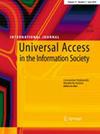Automatic captions on video calls: a must for the older adults
IF 2.7
4区 计算机科学
Q3 COMPUTER SCIENCE, CYBERNETICS
引用次数: 0
Abstract
Abstract In recent years, the use of video call or video conference tools has not stopped increasing, and especially due to the COVID-19 pandemic, the use of video calls increased in the educational and work spheres, but also in the family sphere, due to the risks of contagion in face-to-face meetings. Throughout the world, many older people are affected by hearing loss. Auditory functional diversity can make it difficult to enjoy video calls. Using automatic captions might help these people, but not all video calling tools offer this functionality, and some offer it in some languages. We developed an automatic conversation captioning tool using Automatic Speech Recognition and Speech to Text, using the free software tool Coqui STT. This automatic captioning tool is independent of the video call platform used and allows older adults or anyone with auditory functional diversity to enjoy video calls in a simple way. A transparent user interface was designed for our tool that overlays the video call window, and the tool allows us to easily change the text size, color, and background settings. It is also important to remember that many older people have visual functional diversity, so they could have problems reading the texts, thus it is important that each person can adapt the text to their needs. An analysis has been carried out that includes older people to analyze the benefits of the interface, as well as some configuration preferences, and a proposal to improve the way the text is displayed on the screen. Spanish and English were tested during the investigation, but the tool allows us to easily install dozens of new languages based on models trained for Coqui STT.视频通话的自动字幕:老年人的必备功能
近年来,视频通话或视频会议工具的使用一直在不断增加,特别是由于新冠肺炎疫情,由于面对面会议的传染风险,视频通话在教育和工作领域的使用有所增加,在家庭领域也有所增加。在世界各地,许多老年人都受到听力损失的影响。听觉功能的多样性会使人们难以享受视频通话。使用自动字幕可能会对这些人有所帮助,但并不是所有的视频通话工具都提供这种功能,有些工具只提供某些语言的功能。我们利用免费的Coqui STT软件工具,利用自动语音识别和语音转文本开发了一个自动对话字幕工具。这种自动字幕工具独立于所使用的视频通话平台,允许老年人或任何有听觉功能多样性的人以简单的方式享受视频通话。我们为我们的工具设计了一个透明的用户界面,覆盖视频通话窗口,该工具允许我们轻松更改文本大小,颜色和背景设置。同样重要的是要记住,许多老年人具有视觉功能多样性,因此他们在阅读文本时可能有问题,因此每个人都能根据自己的需要调整文本是很重要的。已经进行了一项分析,包括老年人来分析界面的好处,以及一些配置偏好,并提出了改进文本在屏幕上显示方式的建议。在调查期间测试了西班牙语和英语,但该工具允许我们轻松地安装基于Coqui STT训练的模型的数十种新语言。
本文章由计算机程序翻译,如有差异,请以英文原文为准。
求助全文
约1分钟内获得全文
求助全文
来源期刊

Universal Access in the Information Society
COMPUTER SCIENCE, CYBERNETICS-
CiteScore
6.10
自引率
16.70%
发文量
81
审稿时长
>12 weeks
期刊介绍:
Universal Access in the Information Society (UAIS) is an international, interdisciplinary refereed journal that solicits original research contributions addressing the accessibility, usability, and, ultimately, acceptability of Information Society Technologies by anyone, anywhere, at anytime, and through any media and device. Universal access refers to the conscious and systematic effort to proactively apply principles, methods and tools of universal design order to develop Information Society Technologies that are accessible and usable by all citizens, including the very young and the elderly and people with different types of disabilities, thus avoiding the need for a posteriori adaptations or specialized design. The journal''s unique focus is on theoretical, methodological, and empirical research, of both technological and non-technological nature, that addresses equitable access and active participation of potentially all citizens in the information society.
 求助内容:
求助内容: 应助结果提醒方式:
应助结果提醒方式:


